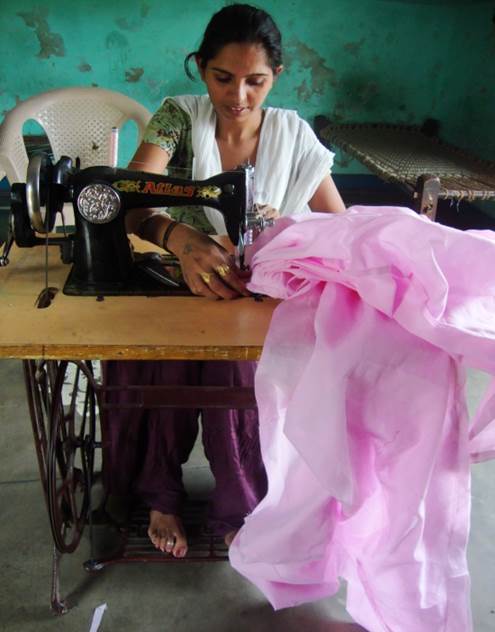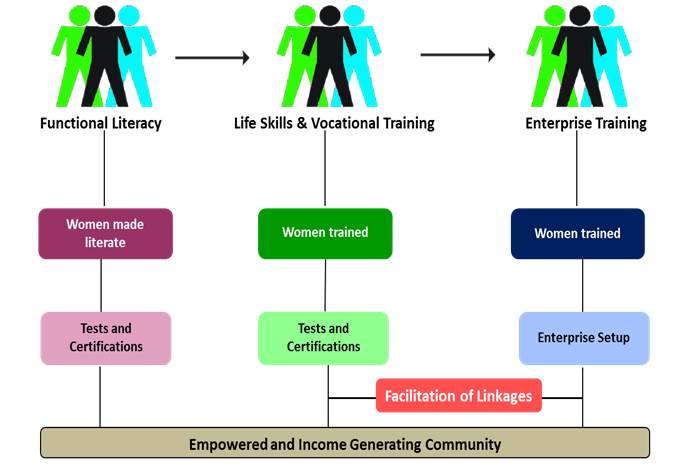|
Literacy to Self-Reliance
The Concept A significant relationship has been observed between literacy, employment and development. Literacy and vocational skills benefit individuals as well as the whole communities and are a key to the socio-economic development. Literacy plays an important role in providing skilled manpower and generating empowerment. However, with the low literacy
rates prevailing in most states across India, developing Working on these lines, the Society for Technology and Action for Rural Advancement (TARA) has established a seamless system where women are first made literate and then their income generation potential is strengthened through various training and capacity building activities, making them self-reliant. A literate and self-reliant woman takes informed decisions at the household level, encourages children to attend school, and may also work to increase the household income. Besides, her family members and the local stakeholders comprise secondary beneficiaries, as they are also sensitised to the importance of education for women and children, and to the significance of women’s contribution to their households. The Approach TARA implements ‘Literacy to Self-Reliance’ concept as a CSR intervention for various corporations and PSUs with the support from TARA Livelihood Academy (TLA) - a training and capacity building arm of the Development Alternatives (DA) Group. The programme consists of the following components: functional literacy (stepping stone for empowerment), life skills training (enhancement of personality, employability and entrepreneurship skills), vocational training (training in industrial demand based specific skills), and enterprise development training (strengthening livelihood systems). The uniqueness of this programme lies in various forms of self-reliance to be achieved by the target group at each stage, starting from achieving literacy to getting employed/self-employed. Depending on their needs and requirements, women move from one stage to the next. Functional Literacy:
The world’s fastest literacy programme (as per
the Wall Street Journal), TARA Akshar+, is an ICT based functional
literacy programme which trains an illiterate person to read and write
(in Hindi) and perform basic numerical skills in just 112 contact hours
(2 hours daily over 56 days). It follows the guidelines of the
National Literacy Mission (India). At the end of the literacy component,
examinations are conducted and women are encouraged to form a reading
club to ensure they practice reading and writing.
Life Skills and Vocational Skills Training: Post the literacy component, selected women (who have undergone TARA Akshar+) are imparted life skills and vocational training. The life skills training lays a foundation for employability and undertaking entrepreneurial ventures and enhances the personality of an individual. Various vocational skills are imparted to women depending on the results of their training and market demands. This is carried out alongside the life skills training. The components of vocational training include: • job oriented modules based on needs assessment survey • basic to advance level training courses • 45-60 days’ training programme Here are some examples of the vocational courses: stitching and tailoring, beautician course, soft toys making, artificial jewellery making etc. Training In Enterprise Development Skills: Interested women are selected from among those who have undergone vocational and life skills training. Here, they learn different aspects of running a business (using International Labour Organisation’s (ILO) Start and Improve Your Business Curriculum) and specialised skills of a given vocation. The features of this programme comprise: • ILO’s SIYB Curriculum o Business Processes o Sales and Marketing o Financial Training • Advance training course in vocational skills • 30 days of training programme Facilitation of Market Linkages: Market linkages (backward and forward) are facilitated and women are acquainted with the current industry and market trends. TARA also helps them to forge market linkages for selling their products or services and also links them with financial institutions/ banks. The activities include: • Self-employment initiation and support • Facilitation of employment by bringing employers and skilled women on a common platform • Support for tie-ups with financial institutions • Hand holding support even beyond the project timeline Outputs and Outcomes: The ‘Literacy to Self-Reliance’ programme was conducted in eleven villages of Uttar Pradesh (districts Gautam Buddh Nagar and Auriaya) through CSR projects of Noida Power Company Limited (NPCL), Greater Noida. and GAIL (India) Limited. • 460+ women trained so far, resulting in increase in household income from Rs.3000 to 14,000 per month • 100+ women directly linked with various income generation activities • 80+ women run their own micro-enterprises setups • lives of over 2700 people impacted directly or indirectly • 30% increase in school attendance of children of literate mothers q SUNANDA JAIN
|
 a large number of sustainable livelihoods, especially for the rural
poor, has emerged as the most significant development challenge of the
century. Women are now being regarded as the most powerful instrument of
change, as their empowerment leads to empowering the family, community
and ultimately the whole nation.
a large number of sustainable livelihoods, especially for the rural
poor, has emerged as the most significant development challenge of the
century. Women are now being regarded as the most powerful instrument of
change, as their empowerment leads to empowering the family, community
and ultimately the whole nation. 